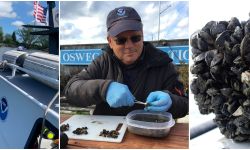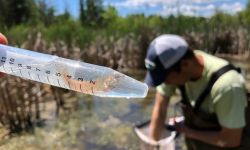Opinion | Michigan’s Hazardous Products Act would help turn off the tap on PFAS
For five years, my team at the Ecology Center has been calling on Michigan policymakers to remove PFAS chemicals from products. The Hazardous Products Act, currently in committee in the state House, would go a long way toward this goal. PFAS are a class of thousands of chemicals accumulating indefinitely and contributing to various diseases. Cutting off their sources is essential.
Michigan has made progress in identifying contaminated sites, providing clean drinking water, and cleaning up PFAS. By filtering out PFAS flowing into wastewater plants, the state has reduced levels in many of our water bodies, fish, and sewage sludge (also known as “biosolids”) that gets spread on farmland. Still, the sources remain unrestricted: In Michigan, PFAS are allowed in any product, from furniture to makeup and firefighting foam. Our Legislature should and can do more.

The Hazardous Products Act HB 5657, introduced by Rep. Penelope Tsernoglou, D-East Lansing, would prohibit PFAS in various consumer products. It would also prohibit the chemicals in firefighting foam used to extinguish flammable liquid fires. Firefighting foam is the culprit in severely polluted sites around the world, including Wurtsmith Air Force Base in Oscoda. When my team sent samples of Oscoda fish for PFAS testing, one of the lab chemists expressed incredulity at the high levels.
In the bill’s current iteration, the products targeted for restriction beginning in 2027 are apparel, carpets, cleaning products, cookware, cosmetics, dental floss, fabric repellent, children’s products, menstrual products, home textiles, ski wax, and upholstered furniture. Non-PFAS alternatives are available and worthwhile, given the enduring health and environmental costs of PFAS. Similar phaseouts are already underway in other states. Michigan should continue to be a leader by setting similar policies.
As long as PFAS are in products, they will build up in every part of our world and our bodies. My team has studied PFAS in everyday items such as cookware, shoes, and child car seats. For example, in a joint study with Indiana University, we found car seats covered with stain-resistant fabric that readily shed PFAS. We also researched two brands of nonstick, PFAS-containing pans. We pinpointed water bodies in Asia and in multiple US states polluted by the supply chains of those pans.
HB 5657 would reduce demand for PFAS, leading to less chemical production. This would reduce factory pollution and prevent PFAS shedding from products when they are used or thrown away.
Prevention also eases the burden on our water utilities. Wastewater utilities receive PFAS-contaminated waste from industrial facilities and home drains. Utilities supplying our drinking water must use available water, even when it contains PFAS. Public water utilities have spent millions of taxpayer dollars improving filtration, which relocates but does not destroy PFAS. Saturated filters go to landfills or incinerators. Landfills can leak, and incinerators release unknown PFAS pollutants into the air.
Certainly, filtering out PFAS at industrial outflows and wastewater inflows is critical. Michigan has also been proactive in setting limits for drinking water, groundwater, and fish. These actions are important. However, to truly “turn off the tap” on PFAS, we need a robust prevention strategy.
The harm from PFAS is not just hypothetical, as I was reminded at a recent conference. A mother shared her kids’ lab results showing inadequate antibody response to childhood vaccines. Immune suppression is a known effect of the PFAS chemical PFOS, to which the family was exposed by eating beef grazed on land contaminated by biosolids. At the same conference, former manufacturing workers who handled PFAS spoke of contending with rare cancers and other conditions.
Michigan firefighters, water utilities, farmers, businesses — really, all of us — have a shared stake in eliminating PFAS in household products and firefighting foam. The health of Michigan families and communities depends on it. Our lawmakers should take a step toward protecting communities from PFAS exposure by enacting the Hazardous Products Act.
See what new members are saying about why they donated to Bridge Michigan:
- “In order for this information to be accurate and unbiased it must be underwritten by its readers, not by special interests.” - Larry S.
- “Not many other media sources report on the topics Bridge does.” - Susan B.
- “Your journalism is outstanding and rare these days.” - Mark S.
If you want to ensure the future of nonpartisan, nonprofit Michigan journalism, please become a member today. You, too, will be asked why you donated and maybe we'll feature your quote next time!




